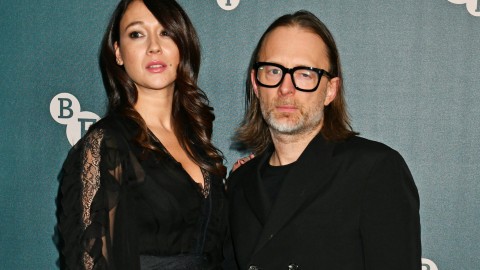
Few have experienced the climactic highs and lows of the music industry to the same degree as Los Angeles bassist Stephen Bruner — better known by stage name Thundercat. From starting his career as a teen in a lesser-known boyband, to winning two Grammys and collaborating with the likes of Kendrick Lamar, Tame Impala, Gorillaz and countless more, the journey the musician has gone on to bring him to this moment has been anything but ordinary.
Now, after wrapping up four back-to-back shows in Camden, the bass virtuoso catches NME at his hotel room in London and takes a look back at the landmark moments that brought him to where he is today. He reflects on how his upbringing shaped him as an artist — raised by parents who worked with ‘60s icons including The Temptations and The Supremes — as well as how his experience of loss has found him covering heavier ground in his own music, namely after the death of close friend Mac Miller.
The tour dates come amid some pretty heavy milestones for Thundercat too, who is celebrating seven years since the release of breakout album ‘Drunk’ this year, as well as the fifth year of his sobriety. Since the shift, he has gone on to release the critically acclaimed album ‘It Is What It Is’, and continued to tease its highly-anticipated follow-up online in recent months. While no official announcements have been shared yet, he assures us the project is definitely on the way, and set to see him take more of an honest approach to songwriting than before. “I’m harnessing pain this time. More pain. Like that moment when Anakin thought he was doing good [in Revenge Of The Sith],” he tells us about the inspiration for the new material. “And I think this time there’s an air of just letting things be what they are. Just accepting things being where they are, and life… whatever life is for me right now.”
In a wide-ranging In Conversation interview before he returns to the UK for a slot at All Points East this summer, he talks about his recent collaboration with Justice, the lesser-known early days of his career, and whether he could imagine bringing his touring days to an end.
NME: Welcome to London, how have you found it having a mini-residency at Koko?
Thundercat: “It was pretty crazy, if I do say so myself. Playing back-to-back sometimes can be challenging because it can wear my voice out a bit, but it was fun. Playing with Justin [Brown] and Dennis [Hamm] is always intense because, even if we’re just chilling, it’s still going to be insane. If we play the same song twice, it’s going to be even more complicated next time around. The setlist will be there, but we’ll just go along with how feels right.”
Touring is by no means a new thing for you. Didn’t you start touring as a teenager with a band called No Curfew?
“That is true, why would you go looking up No Curfew! I was in a little boyband, it was a thing and it was pretty fun. I still talk to a couple of the guys in the band and we’ll see each other every now and again. I’ll come into a city and catch up with members, and they’ll be like ‘I’ve got family now, what are you doing now, Stephen?’ And I’m like ‘I’m still playing video games and collecting Pokémon cards’. They’re like ‘Cool, OK, you didn’t grow up’. I did though, I got a tour bus, I’m an adult.”
Has your perception of live music changed since you first started?
“I’ve always been excited for it. It’s always been the case where I indulge in seeing somebody play live. That excitement has never changed since I was a child and I love that.
“As for it evolving, if anything, going from just playing bass to singing and playing bass was the biggest evolution of it all to me. This is going to sound really dark, but I always knew I would either die drinking or on stage. One of those is out of the way now, because I didn’t die drinking. But I’m still very excited about what comes next.”
How’s the new album coming along?
“I’m working! I’ve been working on it, but I think that the life in between is just as important, so I’ve been trying to not put so much pressure on what it’s supposed to be. I’m just moving in a manner that feels natural to me. I am very much creating music, of course. All the time. But trying not to think so much. We will definitely see what happens in the near future.”
You recently celebrated five years of being sober. Has that sobriety had any impact on how you write music?
“In life, I just chose something different, and what comes with it comes with it. In certain respects, it feels like I had to learn to walk and talk again. I decided to stop drinking in the apocalypse, which wasn’t great timing. I should have held off a little longer…
“It’s just different now, and I’m learning to vibe with who I am without it.”
Any collaborations on the new album?
“Yeah, that’s one of the joys of what I do. I love the idea of collaborating with people, especially when it’s something that feels right. The [most intriguing] part for me is the unknown, that’s what makes it something special. It was the never-expected things in the past that meant the most.
“I’m very excited about things that are going to come in the future. A few things are coming, but I’d rather not say because I always get in trouble for spoiling stuff and being a little bit too keen on talking about it. I’m learning to shut up… but there are definitely things that are coming that are pretty awesome.”
What was it like collaborating with Justice on their new album, ‘Hyperdrama’?
“I love Justice, those are some funky Frenchmen right there. We had worked a little while ago and I didn’t know what to expect personally. All I knew was that I was a fan. I got to see them live before anything and it was mind-blowing.
“Even for me, it was a bit of difference in the sound. I didn’t know how they would feel about it [collaborating], but it was about us doing it together. So when it came to the writing and conveying the ideas, it was hands-on between all three of us, just trying to find the balance.”
Last year you told us André 3000 would be your dream collaboration. Have you managed to listen to his new direction with the ‘New Blue Sun’ album?
“Yes, I have! I got to go to the listening party and I’m very proud of my friends that worked on it and I’m very proud of André 3000 for again stepping into another place. He reminded people that you forget we’re artists. The album is beautiful. There is no separation of him from the rapper to the singer to the producer to the flautist to me. I think that they all are facets of a prism that he is, and it all plays together.
“I’m getting to see him from a different perspective and I’m happy that he’s still here. I’m happy to see him walking around with his beanie on, and on a different path that we’re all here to see. I would still love to work with him, but only as he sees fit — coming from a fan’s perspective.”
You come from a family of skilled musicians. What was it like to be exposed to that level of musicianship from an early age?
“I couldn’t be more grateful for it. It helped me take it seriously and it helped me know that there was something to obsess over that isn’t crazy. As you get older, you start to really appreciate how your parents raised you. I think that’s hitting me harder and harder as time progresses, that our parents really put a lot into us. Sometimes I’ll just tell my dad thanks. I’ll hit him up and say ‘Thank you dad’, or I’ll say ‘I love you’ sometimes — and the best part of telling your dad that is he’ll be like ‘Yeah, I raised you’, which means ‘Shut up and get away from me’. My dad is like one of the loves of my life, and my mum.”
Something else that shaped you as an artist was your love of anime and Japanese culture. What was it that stood out to you from an early age?
“I love the illustration. I love drawing and I’m an illustrator myself — or at least I’d like to think of myself as one. I’ve always been excited about anime, it’s always played a major role in processing for me.
“It’s massive now, and it’s nice to see that it’s become such a big thing. I genuinely blame it on the pandemic that everybody is interested in anime and manga. It’s like they wanted to connect to their kids so they watched Cowboy Bebop… but I used to be the dork [for watching that] because there was only like three of us.”
You can find tickets for Thundercat’s upcoming shows here.
The post Thundercat on the inspiration behind new material: “This time, there’s an air of just letting things be what they are” appeared first on NME.








